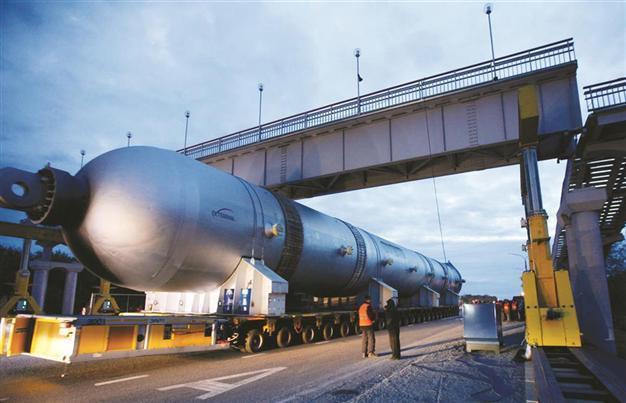Rosneft offers lowball $1.5 billion for TNK-BP minorities
MOSCOW - Reuters

A giant platform transports a 1450-ton-heavy reactor for an oil refining factory under a walking bridge, which was preliminary lifted, along the "Baikal" federal highway in the settlement of Emelyanovo outside Russia's Siberian city of Krasnoyarsk, September 22, 2013. REUTERS/Ilya Naymushin
Oil group Rosneft is to buy the remaining shares in TNK-BP Holding for a fraction of the price it paid BP and a group of oligarchs for their stakes, in a worrying development for minority shareholders in Russian companies.Rosneft bought the holding company and its parent TNK-BP last year in a $55 billion takeover that created the world’s largest publicly traded oil company by output. Minority shareholders own about 5 percent of the unit, now renamed RN Holding.
The deal to buy them out for about $1.5 billion was announced by Rosneft yesterday, after months of tough talk and refusal to acquire the shares had sent jitters through the investor community and raised questions over corporate governance in Russia.
“It will leave a bad impression and raises concerns,” said Chris Weafer, senior partner with consultancy Macro-Advisory.
“The next time a big state company is looking at an acquisition of a company, the investors will be immediately very wary of that situation. Minority investors will run ... rather than wait and see what will happen.”
Rosneft said it planned to buy out holders of ordinary shares at 67 roubles ($2.07) per share and preferred shares at 55 roubles, the company said. In response, TNK-BP ordinary shares rose by almost 5 percent on Monday to 63.3 roubles, while Rosneft was down 1.27 percent.
But the offer disappointed some investors hoping to get closer to the $3.70 a share analysts calculated that oligarchs including Mikhail Fridman received at the time of the TNK-BP buyout. The other tycoons were German Khan, Viktor Vekselberg and Len Blavatnik.
Offer ‘not generous’
“The offer is not that generous compared to the $3.70,” said one shareholder who spoke on condition of anonymity, but did not comment on whether further steps would be taken.
“This is a bad offer,” said Weafer. “The price they are offering to the minorities is almost half what Rosneft paid toBP and the oligarchs... and it sends a negative message.”
Rosneft and its powerful president, Igor Sechin, had repeatedly said that the company had no obligation to buy the remaining shares. Sechin has said that Rosneft is not a “charity fund”.
He changed his tone on Friday, however, saying that the company would consider buying the shares with a 20 to 30 percent premium to the market price.
Sources close to the minority shareholders have told Reuters that they think Rosneft should buy them out for $2.8 billion, based on what it paid for its majority stake in TNK-BP.
Sberbank CIB analysts said in a note: “The only shareholders who will benefit from this are speculators who bought the shares on the cheap during the long period of uncertainty - precisely the people whom Sechin said he wanted to punish.”
Concerns about the treatment of minority shareholders have added to that sentiment.
Veteran investor Mark Mobius, executive chairman of Franklin Templeton’s emerging markets group, said earlier that the TNK-BP buyout “is the kind of issue that gives pause for thought on the behalf of investors coming to Russia”.
Mobius, whose emerging markets fund has invested in TNK-BP, has around $1.2 billion invested in Russia.
















